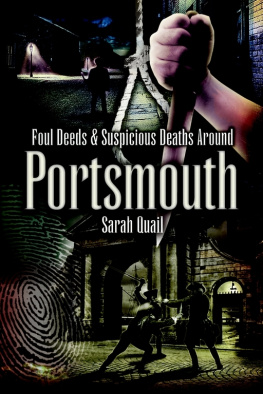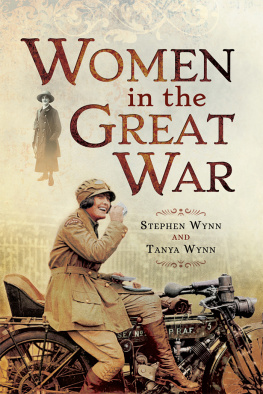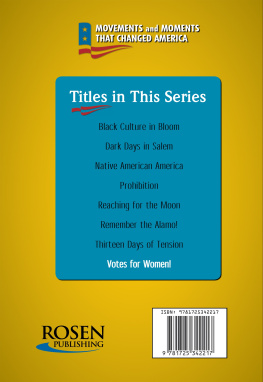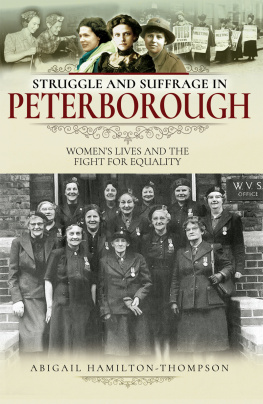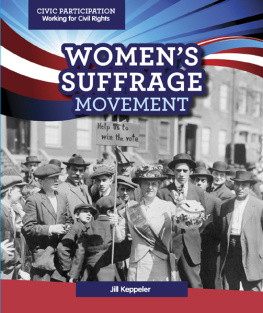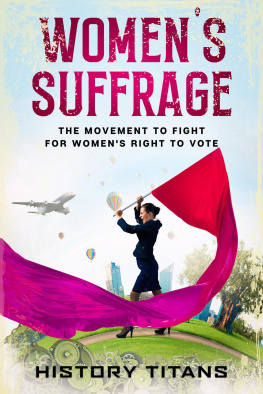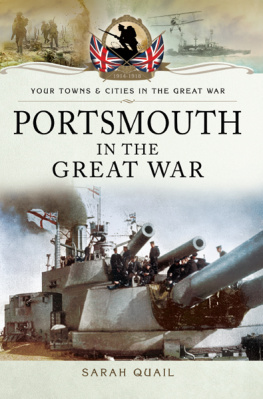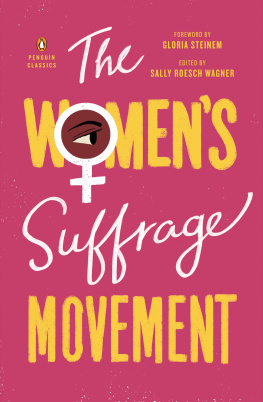Struggle and Suffrage in Portsmouth
Struggle and Suffrage in Portsmouth
Womens Lives and the Fight for Equality
Sarah Quail
First published in Great Britain in 2018
by Pen & Sword HISTORY
An imprint of Pen & Sword Books Limited
Yorkshire Philadelphia
Copyright Sarah Quail, 2018
ISBN 9781526712387
eISBN 9781526712400
Mobi ISBN 9781526712394
The right of Sarah Quail to be identified as Author of this work has been asserted by her in accordance with the Copyright, Designs and Patents Act 1988.
A CIP catalogue record for this book is available from the British Library.
All rights reserved. No part of this book may be reproduced or transmitted in any form or by any means, electronic or mechanical, including photocopying, recording or by any information storage and retrieval system, without permission from the Publisher in writing.
Pen & Sword Books Limited incorporates the imprints of Atlas,
Archaeology, Aviation, Discovery, Family History, Fiction, History, Maritime,
Military, Military Classics, Politics, Select, Transport, True Crime, Air World,
Frontline Publishing, Leo Cooper, Remember When, Seaforth Publishing,
The Praetorian Press, Wharncliffe Local History, Wharncliffe Transport,
Wharncliffe True Crime and White Owl.
For a complete list of Pen & Sword titles please contact
PEN & SWORD BOOKS LIMITED
47 Church Street, Barnsley, South Yorkshire, S70 2AS, England
Email:
www.pen-and-sword.co.uk
Or
PEN & SWORD BOOKS LIMITED
1950 Lawrence Rd, Havertown, PA 19083, USA
Email:
www.penandswordbooks.com
This book is dedicated to the memory of
Norah OShea and local members of
the NUWSS and the WSPU who campaigned
for the vote on behalf of
the working women of Portsmouth
who did not have the time.
Preface
***
What you put down on paper can often acquire a life of its own! I did not set out to write a political history. I fully intended to produce much more of a social and economic narrative but the constraints of time and space, and my own inclinations, produced this book which covers mainly the hundred year period between 1850 and 1950. I hope it does justice to a subject which has fascinated me since I discovered the campaigning Misses OShea when I was researching my Portsmouth Paper, Votes for Women, in the early 1980s.
The womens fight for the vote in Portsmouth was essentially a middle-class campaign: a campaign fought by middle-class women on behalf of their working-class sisters because they did not have the time to fight as one suffragist put it succinctly shortly before the First World War. The campaign was driven by three main factors. Initially it was outrage that large numbers of women, needing to supplement what money they received from their soldier and sailor menfolk deployed overseas, or employed in the dockyard, were forced to work as sweated labour in local stay factories for pitiful sums of money. (The words stay and corset will be used synonymously depending on how the word has been used in the relevant source.) Younger women in turn supplemented what little they earned by working at night as prostitutes in the brothels and beer shops of the dockyard suburbs of the old town of Portsmouth, Portsea and Landport.
The introduction of the outrageously unfair Contagious Diseases Acts from 1864 played its part too. Interestingly their introduction did not provoke the reaction in Portsmouth which they did elsewhere. Possibly there was general acknowledgement in this particular town that the good health of the armed forces was of paramount importance. There were protests but equally many local prostitutes were very happy to be able to brandish a clean bill of health in front of possible patrons! However, the inconsistency in the treatment of the sexes inherent in the Acts not only drove resistance to the legislation and fuelled the campaign for their repeal around the country, but also spurred debate in the town as elsewhere on the general inequality of the sexes.
Thirdly, and of more concern to local women at the other end of the social scale, was the manifest lack of opportunities for unmarried, middle-class women who were barred by their sex from the professions. Working as a governess was one of the few careers open to them but as the Bront sisters and Charlottes heroine, Jane Eyre, discovered, the pay was poor and the women occupied an ambivalent social position. Portsmouths satellite, middle-class, seaside suburb of Southsea had more than its fair share of such women.
In fact Southseas elegant terraces and villas were described in the middle of the nineteenth century as a community positively dominated by women: young female servants and the women who outnumbered the men in their own families. These were the well-bred daughters of naval and military officers, active and retired, local business and professional men, and fundholders (individuals who lived on invested income). They remained at home until they married, and the restrictions placed on their lives meant that many never married.
This book traces the efforts of Portsmouth women to secure the vote in this most masculine of cities, as it was described by HRH The Princess of Wales in 1992 when she was given the freedom of the city, and contemplated in her speech of acceptance quite why she had been given it! It is a story told within a general survey of Portsmouth womens lives, and their developing role in the life of the town from the mid-nineteenth century. (It became a city in 1926.) Inevitably this informed the efforts of campaigners to force the issue of equality both locally and nationally.
Acknowledgements
***
First of all, I must thank the members of staff of the Portsmouth History Centre who most courteously retrieved a very large number of records for me to study over a twelve-month period. Michael Gunton and John Stedman have also given me helpful advice about recent deposits of archive material which they thought I might usefully examine. Former colleagues, particularly Diana Gregg, helped me identify and pursue the suffragists, the Misses OShea, through the complications of the census records when we all worked in Museum Road. I am also grateful to Rachel Moriarty who lent me reference material on the Deaconess Community of St Andrew, and alerted me to the Song of the Shirt, and to Barbara Davis who told me about Mrs Haylett and her banner on Fratton Bridge. David Jordan gave me help identifying useful individuals for study.
I am also indebted to the many talented historians whose contributions to the Portsmouth Papers series, launched by Portsmouth City Council exactly fifty years ago in 1967, have created a wealth of information on the history of this city for use today. Such a resource is the envy of many much bigger communities. There are now almost eighty titles. Many of the writers have been local people but a number are working elsewhere, not only in this country but also in other parts of the English-speaking world. On my reckoning, this achievement represents at least 912,000 accessible, affordable words. It is new thinking on different aspects of Portsmouths history and each title is fully illustrated. I could not have pulled this book together in the time available to me without the help of many of these writers. So, thank you.


